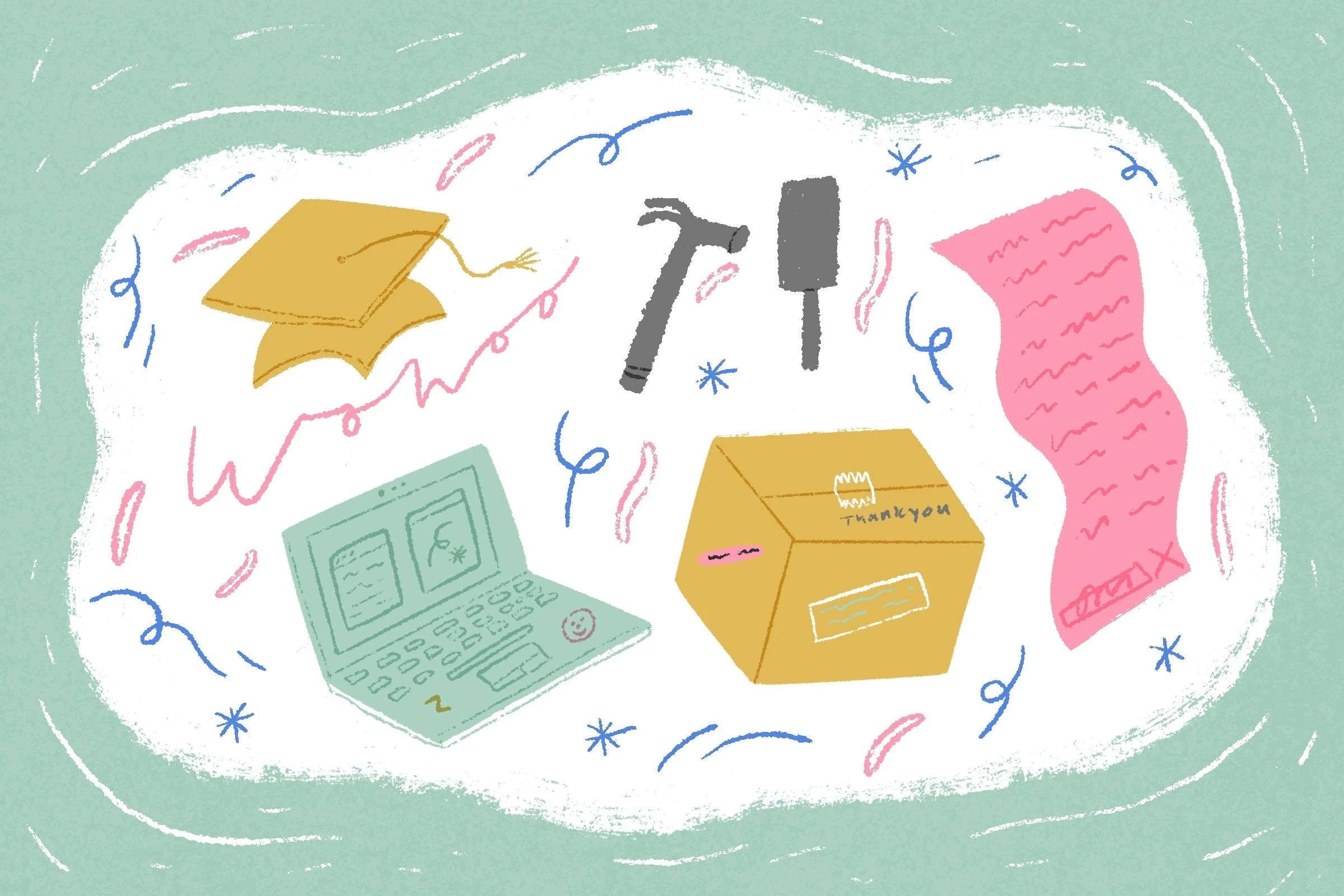How to navigate creative-industry sceptic parents
Illustrated by Connie Noble
Written by Emily Vernon, Global Experience Lead @ Reckitt
Published 15th February
Making your path in your chosen career can be daunting. This can include finding the right first internship or position, the next move, impressing your superiors, dealing with setbacks and forks in the road. But for aspiring creatives, there is often an added challenge: the creative industry might as well be wizardry for some muggle parents.
The scope of the design industry and all its associated roles is indeed more difficult to grasp than the traditional ‘professions’, and not exactly self-explanatory. Brand experience lead, creative strategist, UX or service designer – the list is endless and constantly evolving.
However, it can be hard – and disheartening – to face the bafflement and associated worry among our parents at exactly the time when we need their support most. While my own parents could see the application of design since I was a teen (we lived a winding drive from the ArtCentre College of Design), I quickly realised that was quite unusual. Anecdotes highlight that parental ignorance is wide-spread and can even translate into downright opposition. I have heard many stories of parents urging their children to ditch the pipedreams of creative roles for ‘a real job’; vocal disappointment at wasted potential; concerns over financial future; and even major conflict.
How can you counter such doubts? How do you ensure you have the support you need, even if your parents don’t understand or appreciate the enormous value of the creative industry – both culturally and economically?
You’re not alone
Firstly, remind yourself you’re not alone. Tales of unsupportive parents abound. In our team at Reckitt many have encountered varying degrees of scepticism among parents over the years. My colleague Ainhoa, for example, was very much pushed into a more conventional career when she was younger. Only later in life did she find the courage – and support through her partner – to pursue her dreams of a creative path, and she has loved it ever since. “I don’t have a creative-minded family and they still don’t understand the value of design, but for me it is a privilege to do something every day that I truly enjoy,” she adds.
It is also a subject that comes up repeatedly with the mentoring I do. Families are complex and everyone’s experience is different, but a lack of understanding among our parents is more common than you think.
Be patient
It’s hard trying to force someone to understand a different point of view – or educate them on the complexities of something that is totally alien to them. You therefore have to be patient and not expect big leaps. Instead, take baby steps. Trying to frame the conversation in a way that makes it more accessible for your parents is a start. My mum got the concept of experiential design when I took her to a Starbucks in Milan. All of a sudden, the abstract theory of customer experience made sense to her.
Also, if you think the first years are tough trying to explain your career choices to your parents, don’t expect the challenge to ever go away completely. I’ve been working for over a decade and am still concerned when I break any career news to mine. In many cases that nervousness about your parents’ judgement of your career and life choices doesn’t go away but fades into some sort of mutual understanding over time – even if it’s still largely ‘not understanding’.
Finding different voices
Remember that your parents are only one voice during your formative years. They too find it hard to transition into a different role in your life when they are no longer solely responsible for your wellbeing. It’s a struggle for parents to step back when their kids are trying to make their own way. As my colleague Darren pointed out, “your parents’ is only one point of view, and the decision of what path to follow is yours”. If they find it hard to understand and support your creative ambition, seek out people in the industry that understand the breadth of creative roles.
You need to find input from other people, those that can help you navigate the hurdles every career encounters. They can reassure you without the ulterior motive of wanting to push you towards a job that they can understand.
Build your support network
On a practical level, connecting with like-minded people has never been so easy. Mentorships, for example, are far less rigid and formal than they once were. There are numerous platforms that allow you to connect with leaders and individuals that are willing and able to lend an ear, support and advice. From The Arena to other forums such as The Amazing Design People List, UX Coffee Hours and The Design Community Hub or individual Slack groups, myriad platforms allow you to connect with like-minded people. This open-source mentoring approach is far more welcoming and accessible than it once was and allows everyone to reach out to the support they need.
Embrace the breadth of opportunities
One of the biggest challenges when talking to your parents is tackling the stereotypes and preconceptions around creative career paths. From the one extreme of the failed artist to the other of the flamboyant fashion star, these associations aren’t particularly helpful, as they don’t represent the breadth of opportunities in the creative industries. At best, when asked to name designer role models, non-creatives can conjure mid-century furniture greats or graphic designers associated with iconic cultural moments.
But creative talent hides in plainer sight today. For example, three grades ahead of me in industrial design at Rhode Island School of Design was Joe Gebbia. He is an art school graduate, industrial design student, inventor of the Critbuns (perhaps not one to write home about), who also happened to co-found Airbnb (definitely one to highlight). If you love sculpture, yes, you can become a sculptor. But you could also become a teacher, a writer on the arts or go into packaging or manufacturing – or indeed end up a brand experience lead at Reckitt (like former aspiring sculptor Darren).
Try to point out this breadth of roles. It will give parents the reassurance that art or design has many opportunities. Pointing out individuals, such as the Gebbias of this world, should also help you gradually seed more understanding.
Our beloved muggles might not ever grasp the potential of the wizarding world fully but hopefully they will gradually learn to accept and respect it over time.
About the author
Emily leads the end-to-end experience for Reckitt’s B2B hygiene solutions. For more than ten years, both agency- and client-side, she has enabled brands to better engage their audiences through experience, ranging from products to service rituals, physical environments and digital platforms.



